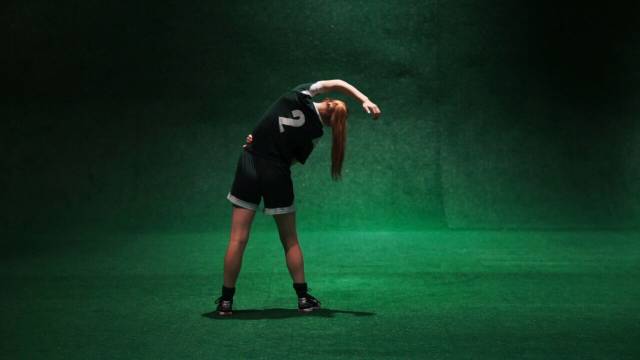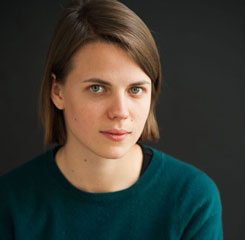

Powerful for the way it looks at the moments between the actual action of the story, Sarah DeLappe’s play The Wolves follows a high school women’s indoor soccer team. Dropping in on their warm-up sessions before games, the play, from the Playwrights Realm at The Duke at 42nd Street, allows us to listen in on the conversations they have when no one else, no coach or parent or teacher, is around to supervise them. Unrestrained by the adults in their lives, these warm-ups give the girls a rare outlet to speak, and listening to them affords a rare and moving experience.
We spoke to DeLappe about the experience behind the scenes.

The play is so incredible! Tell me about your experience with it.
This is my first production. It’s not my first play that I’ve ever written, but it’s the first play that I’ve ever had produced. It’s exceeded all my expectations. I’ve had such an amazing time working with the director, Lila Neugebaur, with our incredible cast, with the amazing team of designers. It’s been a real dream experience.
I wrote the first draft two years ago. I went to this exhibit at the New Museum the summer of 2014 called “Here and Elsewhere” that was a survey of contemporary art from the Middle East and North Africa. I was incredibly moved by this exhibition. I found a lot of it to be really viscerally affecting. The artists were dealing with their daily political reality, suicide bombs and drones and civil wars, and I felt such a great distance from that as I was on the Bowery. For some reason, as I was on the subway back home, I started writing the first scene of the play on my phone. I think that impulse was “what could be further away than a bunch of teenage girls on a soccer field, warming up for their soccer game?” So, that’s where the play started for me.
I know something I really loved about that first scene is how the girls are all talking over each other. What was it like developing their team dynamic?
It was so fun to work with these actors. We spent the summer at New York Stage and Film in Poughkeepsie, and all of the actors and the girls on the team were up there. Lila had them practicing soccer every morning for two hours outside on the soccer field, which I think went a long way in achieving their really tremendous ensemble work. I feel it’s such a great equalizer to have a lot of actors out there sweating and doing pushups and laps and drills. They were also all living together. But in terms of achieving the actual overlap on stage, I think a lot of that comes from the script itself. When you read it, it looks like on the page there’s a lot of overlapping text. I think of it as a musical score. I think Lila, in directing it, was achieving that musical score while also pairing it with the physical score, which is incredibly important to the play of them all going through their warm up in perfect unison for most of the play.
What drew you to a sports team as a way of telling this story, and soccer in particular?
Well, I played soccer as a child. I feel like it’s almost a rite of passage for a lot of suburban America. For me, I played a couple of other sports too, and I didn’t play soccer at the level of the girls on this team. But, I think I was interested in having a story filled with young women in which they weren’t girlfriends or daughters or love interests or sexual objects, but where they were athletes. Where it was about their bodies, but about their ownership of their own bodies, and the strength of their own bodies. So I think that was also part of it.
It definitely comes across as a really powerful team dynamic. Coming off of the athleticism of it all, there’s a great athletic moment in the play when player 00 is alone onstage. What were you hoping to convey with that?
I don’t want to spoil it for people, but I’ve had a few talkbacks with our time with The Wolves where people have asked the same question you’re asking. What is going on there? I think for me it’s a placeholder. That scene is a placeholder for a larger event happening in the play. I think it’s important that it just injects mystery and the question that something’s happened, but what is it that’s happened? Obviously, this character who’s been silent and tormented, tormenting herself throughout the play, is going through something, but it’s unclear what. I really enjoy the ambiguity of that. It sets the stage; it prepares us for the final scene of the play. For so much of the play, they’re talking freely among themselves because there’s no one there to observe them, there isn’t a coach, or a parent or a teacher, they are talking on top of each other and kind of chaotically. In that scene, I feel like she is expressing something physically which she can’t express through language, and that there are certain things you go through that you can’t express, and she is going through something purely physically in that scene.

Going back to the whole team, I just think that “wolves” is such a great name for them. How did you zero in on wolves as the way to define this group?
At one point in the writing process, I remember making a list of possible team names. I narrowed it down to the Eagles and the Wolves, because I was always interested in how this play was about a certain kind of American exceptionalism. I felt like the Eagles was too on the nose, and the wolves feel so – I can’t imagine any other word because they’re a pack, and that’s really where the name came from.
It really does fit perfectly. I thought the structure of the play was really interesting, almost like a Greek tragedy in how the warm-up sessions happen around the action. How did you decide to tell the story that way?
That’s a difficult question, because as soon as I started writing I knew that every scene would be a warm up for a soccer game. I also started thinking of it as a war movie, in that every scene was about them preparing for battle, but instead of watching a bunch of 19-year-old men preparing to go to war, we were watching a bunch of 16-year-old women preparing to go to their soccer game, AKA their battle. Which is also very similar to the Greek tragedy, in that everything is happening offstage. I think that’s where that impulse came. I think it’s compelling to watch people prepare for something, to watch the moments before or the moments after life’s big events.
Performances of The Wolves continue through December 29 at The Duke on 42nd Street.